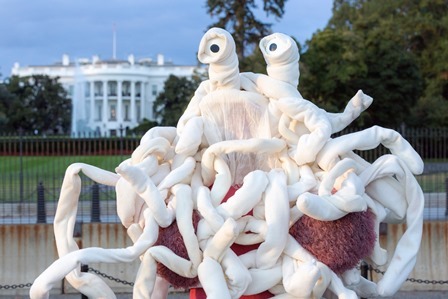Oh, dear. Have I unleashed a monster?
A Flying Spaghetti Monster, that is? Last month in these pages I published a call for government to treat the followers of His Noodliness just as they would believers in any other religion. This month, Pastafarians put the Feds to the test.
To you and me, Friday, October 17, may just have been the start of another weekend, but for followers of the Flying Spaghetti Monster, National Pasta Day was a monumental occasion. On that day, colander-capped Pastafarians marched on Washington to hand-deliver a letter of intent to establish the P.A.S.T.A Foundation. Among them was the (costumed) incarnation of the FSM himself.
"Ahoy from the P.A.S.T.A. Foundation!" their letter to the Internal Revenue Service reads. "Our stated mission is to advocate for understanding and acceptance of the Church of the Flying Spaghetti Monster, all praise His Noodliness." The acronym stands for "People for the Advancement of Spaghetti Tolerance & Appreciation."
I happen to know all this, because the founders of the, er, foundation contacted me with the offer an exclusive interview with their executive director, Andrea Desky. Who am I to turn down an exclusive?
Asked why they'd taken this step, Desky explained, "Our faith has been growing exponentially across the globe in the past decade ... We realized that an organization needed to be founded to educate the public about who we are and what we stand for, and most importantly to advocate for equal rights."
Like many religions, the Pastafarians make expert use of the media. They've created a short, neatly produced video of their expedition.
Given their antic and piratical culture, not to mention their tendency to pray "In the Name of the Pasta, and of the Sauce, and of the Holy Meatballs," I asked Desky if Pastafarians should be regarded as authentic worshipers of His Spaghettiness or just in it for the, uh, saucy fun.
"Well, I think you could say that's true of a lot of other mainstream religions today, particularly Judeo-Christian religions," she replied. "You can ... feel strongly about fostering community and about having rituals and a sense of belonging without clinging on to the literal interpretation of the Scripture."
To a humanist observer of religion, that makes sense. But what of Washingtonians?
"As Pastafarians, we are accustomed to inquisitive stares at our colanders," Desky recounted, but "we had an overwhelmingly positive response. We had dozens of people approach us for photo ops, and we got hundreds of smiles. We brought a lot of joy to the nation's capital."
Desky says roughly a third of those they encountered recognized and cheered them, including a White House guard. As for the rest, "we just explained, 'This is the creator of our universe, and if you if you don't believe that, it's okay. He's really not that vain.'"
"Explained" means just that. For all their desire to reach a broader audience, the Pastafarians don't believe in proselytizing. Their mysterious divinity has somehow communicated his wishes, not as Ten Commandments but as a set of eight "I'd Really Rather You Didn'ts." First on the list is: "I'd Really Rather You Didn't Act Like a Sanctimonious Holier-Than-Thou Ass When Describing My Noodly Goodness."
Desky says, "We don't take ourselves too seriously, but our beliefs are very sincerely held. We just want to make sure the world understands that."
I believe her. The one word that best describes Pastafarians to date is "fun." Still, as a humanist, I see some peril ahead. It's hard to keep the fun going once you become an institution. The early Christians were communal to an extraordinary degree, but with leadership at stake it didn't take long for a "Paul vs. James" battle of the saints to break out. Same with Islam: The moment the Prophet was dead, a struggle for succession began. It continues, often violently, today. Humanists, too, have had their splits, though so far as I know no blood has been spilled.
"Ah, c'mon, Clay," you say, "no one could take the FSM stuff seriously enough to fight over it." Maybe not. But consider the Church of Scientology. There is endless controversy over whether L. Ron Hubbard, the science fiction writer who founded the religion from scratch, did so from cynical or sincere motives. What cannot be disputed is that the central myths of the religion, which include 1950s-style aircraft, hydrogen bombs, and other bizarre cultural references, make Pastafarian beliefs in His Noodliness seem tame and mainstream. Yet, however outlandish the theological claims of Scientology, its effects on the lives of people involved have been, in numerous instances, painful and costly.
So, in taking this step, Pastafarians had best turn their gaze from the celestial glories of the Flying Spaghetti Monster and take a cold, hard look at human nature. If and when money, power, and status are at stake, the party will be over. To prepare for that, the foundation will have to invest time and effort in building democratic structures, but even then there will be struggle.
Still, it is the prerogative of Pastafarians to go mainstream. As Desky notes:
"The First Amendment prohibits making any law to establish or abridge religion, so the State can't use its discretion to honor religions it finds favorable. We think that's unconstitutional ... We want to do more to reach a broader audience. We need the assistance of tax-exempt status. We've earned it, and the government shouldn't have the right to say otherwise."
What else can I say but... R'amen to that.

